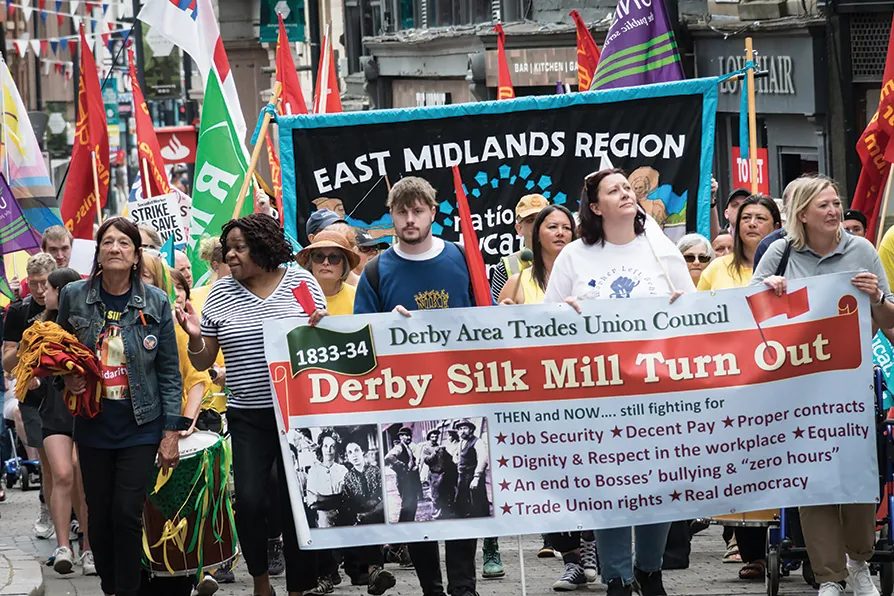The Carpathia isn’t coming to rescue this government still swimming in the mire, writes LINDA PENTZ GUNTER
BILL GREENSHIELDS invites all and sundry to this years’ Derby Silk Mill Lockout March, Rally and People’s Festival on June 7

 Long-planned and organised annual Derby Silk Mill Lockout March, Rally and People’s Festival /Pic: Author supplied
Long-planned and organised annual Derby Silk Mill Lockout March, Rally and People’s Festival /Pic: Author supplied
NOT ALL those demanding that the government change from its current course locally, nationally and internationally will be in London on June 7.
While the focus of attention and mobilisation must be on People’s Assembly’s timely and massively significant London demonstration and rally on that day, the People’s Assembly and the TUC have agreed that the long-planned and organised annual Derby Silk Mill Lockout March, Rally and People’s Festival with its exhortation “Remember the Past and Fight for the Future” should go ahead as a focus in the East Midlands for those not travelling to London.
The story of the Derby Silk Mill industrial workers’ brave and groundbreaking struggle over eight months in 1833 and 1834 coincided with that of the Tolpuddle agricultural workers — though it is much less well known.
Confronted by an employer imposing punitive pay cuts and demanding that the workers give up their commitment to forming a union, the Derby workers resisted, declaring a strike, and were consequently not only locked out of work but were then attacked by every arm of the state and its loyal servants — the law and the courts, the media, the rudimentary education system, the church, the military.
Their marches and demonstrations were banned, they were subject to the lies and partisan distortions of the press, their kids were excluded from school, they faced excommunication from the church, and were subject to violent repression from the 95th (Derbyshire) Regiment of Foot, which later became part of The Sherwood Foresters, with its later history of repression of the Chartists in England and Wales, and its use to oppress resistance movements in, for example, Ireland, South Africa, Aden, Palestine, Libya, Malaya and Greece.
However, other workers rallied to the cause, and strike action and support and solidarity systems sprang up and spread not only to the other silk mills of the Derwent Vally but across the Midlands.
But after eight months of vilification and oppression by employers’ organisations and their state, and extreme hardship turning to starvation for many, the strike collapsed, and afterwards many were blacklisted by the employers — a practice that continues to this day.
But the militancy of the silk mill struggle lived on in the unrest and resistance to the 1834 Poor Law, which took many forms, from rallies and public meetings across the country and riot and physical challenge in a number of towns.
And then in 1838 all the lessons and experience of class struggle came together with the establishment of the Chartist movement, referred to at the time by Karl Marx as “the first truly independent Party of the Working Class,” their People’s Charter focused on electoral reform — but also sparked a new wave of industrial militancy which built the Grand National Consolidated Trade Union, leading to the trade union movement of today.
So, in fact, not such a crushing defeat… but part of the generational continuing class struggle, and Britain’s road to socialism.
Next month’s demonstration in London continues on that road — organised by the People’s Assembly with our People’s Charter 2025 proposing a better future for the working class if we “Remember our Past and Fight for our Future.”
In Derby at the Silk Mill March, Rally and Festival the day begins at 10.15am in Derby Market Place with a lively and loud procession through the town of unions and campaign groups, with rousing speeches at each end.
The festival has live bands and poetry, dozens of community stalls, food and drink, and kids’ playbus, facepainting and other entertainment.
At the end of march rally we will be hearing from Stewart Richards - TUC Midlands secretary, Ian Lawrence – president of GFTU, Kate Flannery – Orgreave Truth & Justice Campaign secretary, and Fraser McGuire – Trades Union Congress young members’ committee chair. The March will have been set off by Cecile Wright – Derby Area Trades Union Council president, Marios Doucas – Derby People’s Assembly secretary, Dani Jackson – PCS regional secretary, Adrian Perry - Derby Stop the War/CND and Maire Perkins- Climate Emergency. For more information go to https://www.facebook.com/DerbySilkMillRally.

STEPHEN ARNELL looks back to when protesters took to the streets in London demand to Irish liberty, fair pay and free speech — and wonders what’s changed in 138 years

In part one of a two-part feature, CONOR BOLLINS asks whether we should be concerned about the Prime Minister’s military recruitment plans










